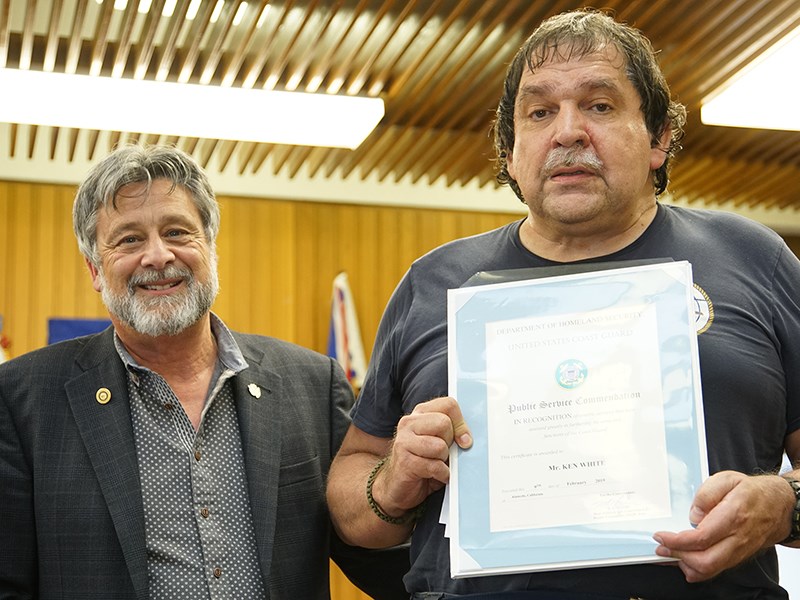Powell River search and rescue volunteer Ken White was recently awarded a Public Service Commendation and recognition from the Canadian Coast Guard and United States Coast Guard for his 40 years of service monitoring local and international maritime radio channels.
White’s home functions as a fully-equipped communication station, where he spends every day from 9 am to 5.30 am in the winter and 9 am until 3.30 am in the summer monitoring high-frequency radio and social media channels for maritime distress calls.
His efforts provided vital communication support for several rescue operations, including some as far afield as California, Nebraska and Louisiana.
White first became interested in the search and rescue service as a teenager after watching the film Flight from Ashiya (1964), which portrays a US Air Force rescue mission in Japan. Young White immersed himself in a Reader’s Digest article on the coast guard service.
“I wanted to get involved with search and rescue, but I wasn’t too sure how to do so,” explained White.
The following Christmas, he received a radio from his aunt, and soon figured out how to tap into local tugboat frequencies. One morning in February 1976, White picked up a conversation that turned out to be his first reception of a distress call.
“This one tugboat indicated that he had heard a seaplane in distress, just off of Powell River mill,” White recalled. “The distress was a seaplane with an engine fire in front of it.”
White quickly got in touch with the Victoria Rescue Coordination Centre. The problem was, this incident took place at 8.15 am, shortly before White was due to be in class at Max Cameron Secondary School.
During recess, he used a payphone to call the rescue coordination centre for an update on the rescue operation. White was pleased to learn the five passengers on board the seaplane had been safely evacuated and escorted to Westview.
During that call, the rescue coordination centre controller asked White if he would serve as a volunteer radio monitor for the Powell River area. White agreed, and soon enrolled in a two-day maritime search and rescue course in Powell River.
“I decided to make a long-term commitment to maritime search and rescue,” said White. “In 1981, I bought my first HF (high frequency) radio set. I was amazed at the reception area I had here in Powell River. I realized my search and rescue role was going to expand very fast.”
Since then, White has monitored high-frequency radio channels daily, sometimes picking up distress calls before they reach Canadian and US Coast Guards.
“Time and time again, I was the first alert into those rescue coordination centres of a mariner in distress in the north Pacific Ocean,” he said.
In one operation, White’s radio picked up a distress call from a car carrier that caught fire in the north Pacific. He was the first to alert the nearest RCC in San Francisco. Luckily, however, the carrier crew were able to control the fire and did not have to evacuate the ship.
In more recent years, White has received some mayday alerts via Facebook.
“The most recent case was just by fluke; I went on Facebook and plain as day, there was somebody indicating a mayday,” he said. “There was a couple trapped in their home in Nebraska. They were surrounded by floodwaters and unable to get out of their house.”
White got in touch with an air force base in Florida, which saw to it that local authorities in Nebraska were notified and able to launch a rescue mission.
The couple was rescued, and later called White to thank him for his supporting role in the operation.
“I’m a humanitarian person in nature,” said White. “I’ll keep doing it until whenever I have to stop.”
White said he was honoured to receive recognition for his work from the US and Canadian coast guards.
Andy Gardiner, the officer in charge at Powell River’s coast guard station, said his team is glad to have White’s help in keeping local mariners safe.
“It’s very much appreciated to know that he’s diligently monitored these specific radio frequencies,” said Gardiner. “He maintains a watch. It’s very valuable.”
Jordan Akiyama, an officer at Alameda Coast Guard Station in California, agreed.
“He’s been a tremendous help to the coast guard,” said Akiyama. “He dedicates a lot of his personal time and personal money to helping the coast guard look for mariners in distress.”



